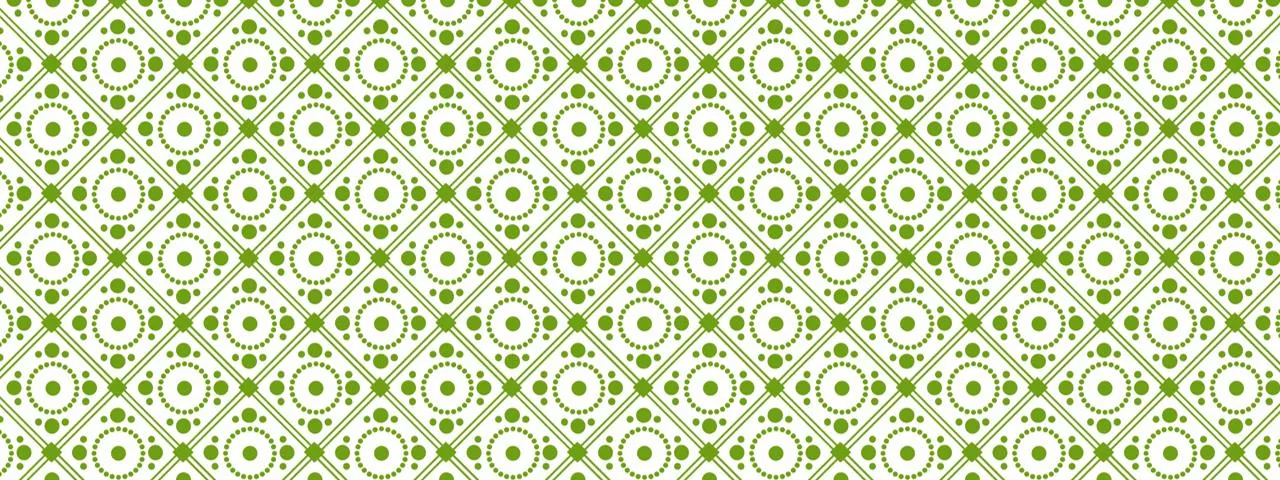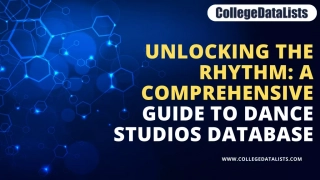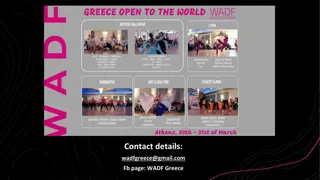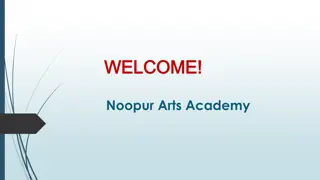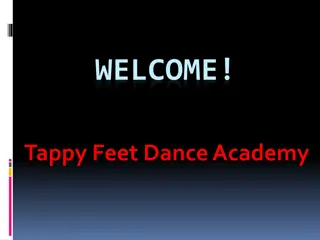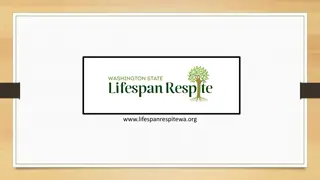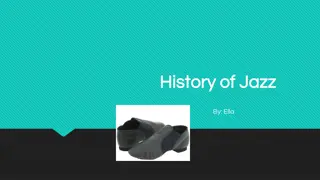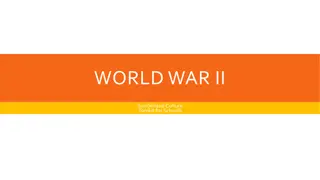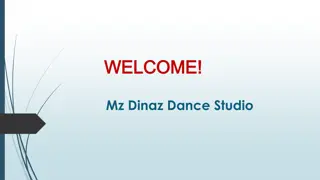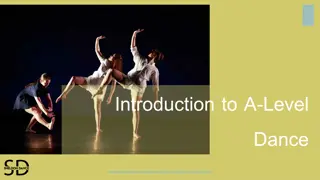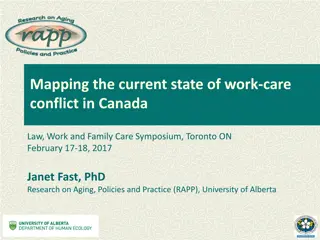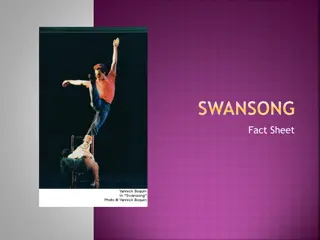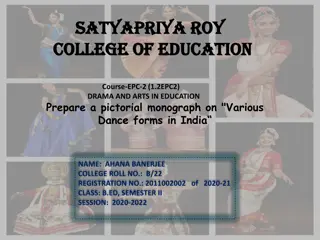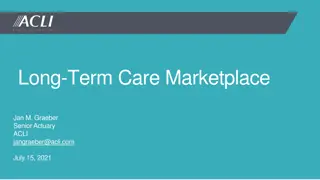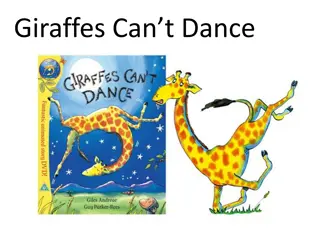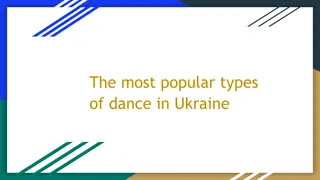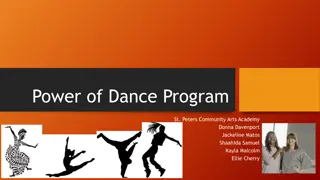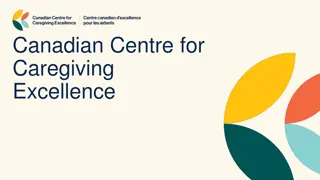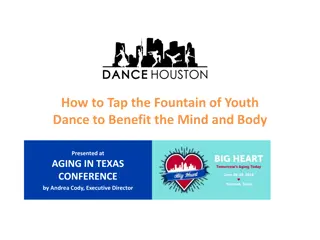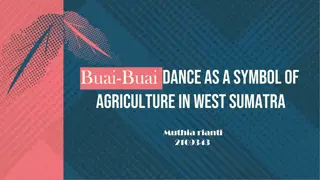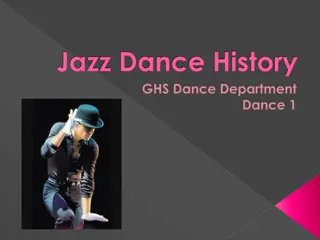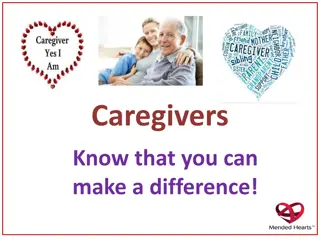Innovative Approach to Supporting Long-Term Caregivers Through Dance Movement Therapy
This project, DanceCARE, aims to offer emotional education and support to long-term caregivers through innovative tools like Dance Movement Therapy and Conscious Movement. By focusing on the holistic well-being of caregivers, the program seeks to reduce the burden, depression, and isolation experienced by both informal and formal caregivers. Through embodied cognition and networking, DanceCARE strives to enhance the quality of life for aging individuals and those in their care, promoting communication and well-being.
Download Presentation

Please find below an Image/Link to download the presentation.
The content on the website is provided AS IS for your information and personal use only. It may not be sold, licensed, or shared on other websites without obtaining consent from the author. Download presentation by click this link. If you encounter any issues during the download, it is possible that the publisher has removed the file from their server.
E N D
Presentation Transcript
Dance Movement Therapy and Conscious Movement as innovative tools in emotional education and support for long-term caregivers. PROGETTO ERASMUS+ KA220 DANCECARE
OVERVIEW The development of DanceCARE educational program will contribute to a holistic approach to education and training in a lifelong learning perspective. Cooperation partnership in Adult Education HORIZONTAL PRIORITY: Inclusion and diversity in all fields of education, training, youth and sport Additional priority: Creating and promoting learning oportunities among all citizens and generations Improving the availability of hight quality, flexible and recognised learning for adults
EMBODIED COGNITION APPROACH DANCECARE CONCEPT Scientific community has long discussed the need to put bodily processes at the center of education, care and mental health. It could be argued comprehensive intervention that does not also take the body into account. This concept is slowly spreading and DanceCARE represents a valuable step towards a paradigm shift, adopting methodologies. LTC CAREGIVERS NEED FOR SUPPORT TO FACE BURDEN that there is no KEY CHALLENGE: PROVIDING SUPPORT FOR INFORMAL CAREGIVERS (EU LCT Report, 2021) Both informal and formal care is demanding and LTC caregivers are often isolated and at risk psychological distress and depression. mind-body Caregiver BURDEN is a specific form of stress that tends to become chronic the longer the caring situation lasts and manifests itself in the most diverse and subjective forms: NETWORKING As literature shows that only the multi- component intervention significantly reduce the care load, self-help groups and chats intercept the need for networking, counteracting isolation. sleep decline, attention and concentration difficulties, memory difficulties, irritability persistent worry, somatization symptoms, ease of falling ill. problems, appetite problems, mood category can and anxiety,
DANCECARE CONCEPT A caregiver who takes care of him/herself, who is aware of his/her limits and resources also on an emotional level, who fits into a peer group and avoids isolation, will be healthier, will resort less to the use of drugs, will turn less to the health care system; and will also be able to care for his/her elderly person better.
OUTLINE OF OBJECTIVES GENERAL OBJETIVE To reduce the burden of formal and informal LTC caregivers, reducing the risk of depression and isolation 1. Reducing the burden of LTC informal and formal caregivers 2. Reducing depressio n of LCT informal and formal caregiver s 3. Improving the quality of life in ageing and the way in which older people are cared for 4. Reducing isolation and Promoting communic ation and networkin g between different types of LTC carers 5. Systemati ze and field-test the effectiven ess of the body- mind methodol ogies used 6. Enhance and expand the DMT methodol ogies through the inclusion of the WM method 7. Optimize the use of the DanceCA RE education al program through digitizatio n- BLENDED 8. Disseminati ng the created educational program to various training institutions specialized in DMT 9. Involve stakeholder s in adopting the DanceCARE curriculum as an ongoing education tool
TARGET GROUPS INDIREC T DIRECT INFORMAL CAREGIVERS who provide care for an elderly family member or person by choiche and/or necessity, without any kind of remineration OLDER PEOPLE with LTC needs SOCIAL AND HEALTH CARE INSTITUTIONS FORMAL CAREGIVERS who carry out care work in close contact with family members (e.g. live-in carers, family assistant, migrant care workers) PROFESSIONAL DMT ASSOCIATIONS AND SCHOOLS
PARTNERSHIP COORDINATOR INRCA National Public Body - Management, research expert and pilot site Italy UNIVERSITATE DE VALENCIA Higher Education institution - Research expert and pilot site Spain Small and medium sized enterprise - Pilot site partner and dissemination AKTIOS Greece EADMT (European Association of Dance Movement Therapy) Non governamental organization - Metodology expert Germany Wise Motion Community (Doctor Hanna Poikonen) Small and medium sized enterprise - Metodology expert Finland Computer Solution SA Small and medium sized enterprise - Expert for technological part development Greece
FOCUS ON WP2 - PREPARATION AND DESIGN OF THE DANCECARE TRAINING Flavia Galassi [content creator, metodology expert and trainer] Sara Santini [Project Management and P.I.] PROGRAM
D1.1QP + D1.2 Financial Guideline s WP1 Project Management WP2 Preparation and design of the DanceCARE training program D1.3 Interim report D1.4 Final Report TM1 Task 2.1 Online research on LTC caregivers needs D2.1 study design and guidelines for interviewe rs Task 2.2 DMT e WM expert consultation and recruitment Task 2.3 Analysis and matching of the results Task 2.4 Design of the whole DanceCARE curriculum D2.2 guidelines for trainers Task 2.5 Creation of ad hoc videos D2.3 guidelines for making videos Task 2.6 Dissemination and exploitation activities WP3 Development of the DanceCARE platform and chat TM2 Task 3.1 Creation of the DanceCARE platform and chat Task 3.2 Focus groups with end-users Task 3.3 Dissemination and exploitation activities WP4 DanceCARE training activation - PILOT Task 4.1 Recruitment of LTC caregivers Task 4.2 DanceCARE pilot activation Task 4.3 Self-help groups activation Task 4.5 Dissemination and exploitation activities WP5 Assesment of the DanceCARE impact and sharing of the results TM3 Task 5.1 Collection, transcripion and analysis of pilot data Task 5.2 Sharing of the results Task 5.3 Dissemination and exploitation activities ME ME ME
TASK2.1 ON-LINE SEARCH ON LTC CARERS NEEDS AND SOFT SKILLS TO BE DEVELOPED TIME FRAME: from now to 15 march 2024 Responsible Partner: Aktios, Polibienestar + all EXPECTED RESULT: identify 5 soft skills to be developed trough DanceCARE program and write a short report + Writing a Quality Plan (QP) to be shared in the Kick-off meeting (KOM)
TASK2.2 DMT AND WM EXPERTS CONSULTATION TIME FRAME: from now to 30 april 2024 Responsible Partner: EADMT + national association and institutions EXPECTED RESULTS: identify 6 DMT techniques that have proven to be the most effective in cases of stress and depression, trough consultation of DMT and WM experts all over Europe SUB-TASKS: 1. Formulation of the ON-LINE QUESTIONNAIRE to be submitted to DMT experts (english version) [by 15 march] 2. Creation of google modules in Italian, Greek, Spanish (German and Finnish) [by 30 march] 3. Diffusion of the questionnaire trough DMT national associations and institutions [by 30 april] 4. Identify and recruit 3 DMT expert trainers for each pilot site [between 30 april and 15 june]
TASK2.3 ANALYSIS AND MATCHING OF THE RESULTS TIME FRAME: from 30 april to 15 july 2024 Responsible partners: INRCA, Polibienestar EXPECTED RESULT: Report on the results of the on-line consultation + D2.1. Writing the STUDY DESIGN and GUIDELINES FOR INTERVIEWERS SUB-TASKS: 1. Create a dataset based on the questionnaire [by 30 april] 2. Analyse quantitative and qualitative data to identify the most usefull DMT techniques [by 15 june] 3. Write a Report to be used for setting DMT modules [by 30 june] 4. On-line focus group with DMT and WM experts (10) [by 10 july]
TASK2.4 DESIGN OF THE WHOLE DANCECARE CURRICULUM TIME FRAME: from 15 july to15 november 2024 Responsible Partner: WM and EADMT + AKTIOS and all EXPECTED RESULTS: creation of all the modules of the DanceCARE training program and GUIDELINES FOR TRAINERS (D2.2) and GUIDELINES FOR VIDEO MAKING(D2.3) SUB-TASKS: 1. 3 meetings between EADMT and WM for definition of 6-7 modules Body-mind education for stress relief [by 1 october] 2. 2 meetings between Aktios, INRCA and Polibinestar for definition of 3-4 modules How to do if [by 1 october] 3. Setting and writing GUIDELINES FOR VIDEO-MAKING [by 1 october] 4. Setting and writing the GUIDELINES FOR TRAINERS [by 15 november]
TASK2.5 CREATION OF AD HOC VIDEOS TIME FRAME: from 1 october to 31 december 2024 Responsible Partner: INRCA, WM, EADMT all + associated (PoliArte) EXPECTED RESULTS: Creation of at least one ad hoc video per module SUB-TASKS: 1. Involve all the trainers in the creation of videos, following the D2.2. and D2.3. guidelines [by 31 october] 2. Dub/subtitles the videos in the languages of the Partners involved [by 31 december] 3. Start to think about the most suitable platform to be used for DanceCARE program
TASK2.6 DISSEMINATION AND EXPLOITATION ACTIVITIES TIME FRAME: from now to 31 december 2024 Responsible Partner: Aktios, Computer Solution + all (associated partner: PoliArte) SUB-TASKS: 1. Creation of a Logo, font and colors for DanceCARE project to be voted between all partners [by 30 april] 2. Setting a plan for dissemination: define ashtags to be used for the posts on social media, define timing and languages to be used, and other aspects connected to dissemination [by the KOM] 3. Creation of a web site, Facebook and LinkedIN pages for the project, where all partners can post their updates in the country's language to engage the community and raise awareness of LTC [by 15 june]
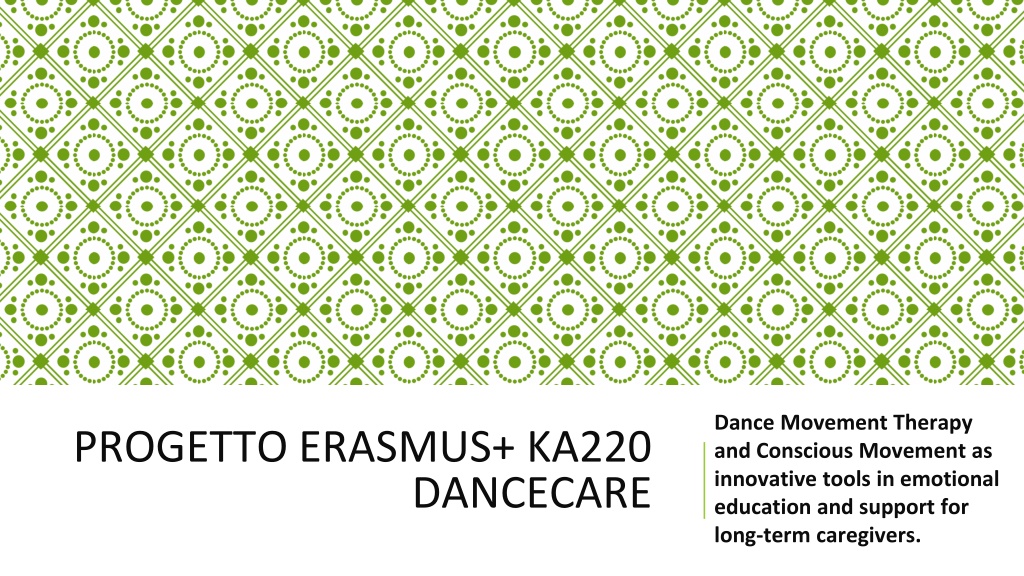
 undefined
undefined
